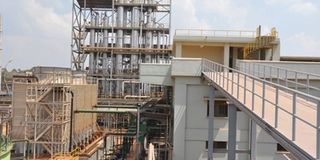Kakira Sugar opens Shs130b ethanol plant

The ethanol distillery at Kakira Sugar Works in Jinja District. PHOTO BY ANDREW KATABULAWO
What you need to know:
- The sugar producer is also said to be currently working with US based firm to develop an ethanol powered cooking stove.
- Energy and Mineral Development Minister, Ms Irene Muloni told Daily Monitor in an interview last week, that the Bill will allow for the blending of between 5 and 15 per cent of ethanol to fuel.
Jinja. Kakira Sugar Limited, a local sugar producer, has started commercial production of ethanol at a $36.6 million (Shs133b) distillery.
The joint managing director, Mr Mayur Madhvani, told Daily Monitor in an interview last week that the distillery, which will be producing 20 million litres of fuel grade anhydrous ethanol (Bio-Fuel), started production in November.
The plant, which was installed by the India-based Praj Industries, will be distilling the product from the 74,000 metric tonnes of molasses that the sugar mill produces annually.
Until the opening of the plant, the molasses had been going to local distillers of the local potent gins, waragi.
Mr Madhvani said that if parliament passes the Biofuels Bill, which Energy and Mineral Development Minister, Ms Irene Muloni, tabled before the house early in December 2016 in line with the provisions of the Renewable Energy Policy for Uganda of 2007, it will provide for the blending of biofuels with fossil fuels (Petroleum Fuel) in regulated proportions.
Ms Muloni told Daily Monitor in an interview last week, that the Bill will allow for the blending of between 5 and 15 per cent of ethanol to fuel.
It is, however, important to note that some countries such as India allow blending of up to 20 per cent of biofuels with fossil fuels, while in others for instance Brazil, some vehicles run on Ethanol alone.
Kakira will not be selling the ethanol on the direct market. It will be selling to firms that are currently engaged in the distribution of petroleum products, which are expecting to carry out the blending before selling the same to motorists.
Blending, according to Mr Madhvani, will come with immense economic benefits for Uganda as it is likely to reduce by close to a fifth, what it has been spending on fuel imports.
According to Trading Economies, Uganda’s imports had risen up to $456.6 million (Shs1.6 trillion) as of September 2016 out of which 24 per cent or $109.584 million (Shs391.2b) went towards the importation of fuel. “It may not come with direct benefits to the individual motorist, but it does to the country. You get to save at least $20million (Shs72b) in foreign exchange, which would have gone towards the importation of fuel,” Mr Madhvani says.
Mr Madhvani argues that the country is also bound to reap environmental benefits.
Besides reduction in the carbon dioxide emissions arising out of the use of fossil fuels, ethanol can also be used in cooking, which might help preserve at least 100,000 hectares of forest cover which is annually cut down to enable Ugandans access charcoal and firewood for cooking.
The sugar producer is also said to be currently working with US based firm to develop an ethanol powered cooking stove.
Uses of ethanol
Ethanol is used extensively as:
Fuel. A fuel and gasoline additive.
Manufacturing. A solvent in the manufacture of varnishes and perfumes
Preservative. A preservative for biological specimens; in the preparation of essences and flavourings in many medicines and drugs
Disinfectant. A disinfectant and in tinctures (such as tincture of iodine)




